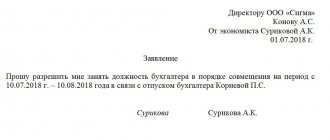Rules for attracting an employee to additional work
The legislative order, namely the Labor Code of the Russian Federation, provides for the possibility of involving employees of the organization in overtime work. In this case, we are talking about work that is carried out outside the time established in the employment contract at the enterprise.
Overtime will be recognized as work that goes beyond the work week, which is approved by a collective or individual agreement between employees and the employer of the organization.
An increase in the volume of work, including through overtime shifts, implies additional payment for the time worked by the employee. The amount of overtime pay is regulated by the Labor Code of the Russian Federation, namely Article 152.
In particular, the additional payment for increasing the volume of work in free time from the main work in the organization in the first two hours is one and a half times the amount, while in the next time it is two times the amount.
It should be remembered that increasing the volume of work and involving the organization’s employees in work outside working hours should be carried out only after a written agreement has been signed with the employee and the amount of payment has been discussed. Only in this case will there be no violation of labor legislation on the territory of the Russian Federation.
How to make an additional payment for an increase in the amount of work - step-by-step instructions
The provisions of labor legislation strictly regulate both the increase in the volume of work itself and the obligation to provide additional payment for such an increase in the employee’s work responsibilities. In this case, both the employee and the employer must ensure compliance with a certain procedural procedure. Step-by-step instructions for establishing additional payments for increasing the volume of work are as follows:
The employee draws up a statement of consent to the establishment of an additional amount of work in the name of the employer. The application is drawn up in free form addressed to the manager with the obligatory indication of the date of preparation, the direct scope of work, the signature and initials of the employee, the details of the enterprise and the data of the manager or personnel employee to whom the application is submitted.
- If the decision to provide additional payment for an increase in the volume of work is not made by the actual manager or the person to whom the application is submitted, then the person who accepted this application should write a memo to the employee or manager responsible for making the final decision, which is also drawn up in free form. But at the same time, in this note, the amount of payment and the time for performing additional work not stipulated by the employment contract, as well as their nature, can no longer be changed and correspond to those specified in the employee’s application.
- The employer or the responsible person issues an order to assign an additional payment to the employee for the additional amount of work. The order must be kept at the enterprise until 75 years from the date of termination of the employee’s work with an increased volume of work. The employee must have the right to review the order at any time.
- If additional work and additional payment for increasing its volume were not regulated in any way, then they are completed by the decision of one of the parties, subject to advance warning to the other party at least three days before the actual termination of such additional relationships.
- An additional payment for an increase in the amount of work must be paid in accordance with the concluded documents, while the procedure for its payment and regularity may include both the inclusion of an additional payment in the employee’s salary on the days it is issued, and separate payments, but at least twice a month.
Who can do additional work and how?
The Labor Code of the Russian Federation allows for additional work at the enterprise. A similar principle is spelled out in Art. 60 of the specified legal acts. Additional work occurs during the duration of the work shift within the organization, as stated by law.
In connection with this possibility, regulated in the labor legislation in force in Russia, there are three fundamental forms of additional work:
- combination of professions and positions;
- expanding the service area and increasing the scope of work;
- performing the duties of an employee who is temporarily absent from the workplace in the organization.
The choice of one form or another, as well as the amount of payment for additional work, depends primarily on the circumstances that force one to enter into an agreement with employees to attract them to work.
1. Article 60.2 establishes the rules for engaging an employee, along with the work specified in the employment contract, to perform additional work in a different or the same profession (position) during the established duration of the working day (shift).
2. According to Part 1 of the commented article, the employer can entrust an employee to perform such additional work only with his written consent and for an additional fee. The amount of additional payment in accordance with Art. 151 of the Labor Code is established by agreement of the parties to the employment contract, taking into account the content and (or) volume of additional work (see commentary to Article 151).
3. In accordance with Part 2 of Art. 60.2 additional work assigned to an employee along with the work specified in the employment contract can be performed by him in the order of combining professions (positions), by expanding service areas, increasing the volume of work, or in connection with the assignment of duties of a temporarily absent employee.
Combination of professions (positions) is the performance by an employee, along with his main work in the profession (position) determined by the employment contract, of additional work in another profession (position) for the same employer during the duration of the working day (shift) established for him. As a rule, the employee is entrusted with combining a vacant position or profession.
In contrast to combining professions (positions), when expanding service areas or increasing the volume of work, the employee performs work in the same profession or position, which is stipulated by the employment contract, but to a greater extent compared to what he performed in accordance with the employment contract.
The performance by an employee of the duties of a temporarily absent employee without releasing him from work in the profession (position) stipulated by the employment contract is permitted both in the same profession (position) that the employee performs in accordance with the employment contract, and in another profession (position).
It should be borne in mind that in cases where, in order to fulfill the duties of a temporarily absent employee, an employee is released from work stipulated by the employment contract, then in this case there is a temporary transfer to another job to replace the temporarily absent employee. Such a transfer is carried out in the manner prescribed by Art. 72.2 (see commentary to it).
4. The law does not establish either a minimum or maximum period for which an employer can entrust an employee to perform additional work along with his main job. In each specific case, the period during which the employee will perform additional work in the order of combining professions (positions), expanding service areas, increasing the volume of work, or in connection with the assignment of duties to a temporarily absent employee, is determined by the employer with the written consent of the employee (Part. 3 Article 60.2). If the employee does not agree with the period determined by the employer, this period may be determined by agreement of the parties. If the parties cannot agree on the period during which additional work must be performed, the employee has the right to refuse to perform it.
The period during which an employee, without release from work specified in the employment contract, will perform the duties of a temporarily absent employee is limited by the period of absence of this employee.
5. According to part 4 of the commented article, the deadline for completing additional work determined by the parties is not binding on them. The employee has the right to refuse to perform additional work ahead of schedule, and the employer has the right to cancel the order to perform it ahead of schedule, warning the other party about this in writing no later than three working days in advance.
At the same time, as follows from the content of this norm, neither the employee nor the employer is obliged to indicate the reason why they early refuse the agreement to perform additional work.
Combination of professions and positions
The combination of professions is regulated by Article 60 of the Labor Code of the Russian Federation. This article provides a full-fledged concept of this form of attracting organization employees to additional work.
Thus, combining professions and positions is work, the scope of which does not contain an employment contract concluded with an employee, but is performed by the subject of legal relations in the organization for another position or profession for an additional payment (fee).
Combining professions (positions) has characteristic features and principles:
- the legislative procedure provides for an agreement between the employer and the employee of the organization to combine professions;
- the time that the employee will spend on additional work is regulated by agreement of the parties (this may be a temporary period until a qualified employee is selected for the vacant position);
- combining professions and positions must be carried out within the boundaries of one organization, otherwise we will be talking about external part-time work;
- the performance of work that determines the agreement of the parties must be carried out during the work shift (otherwise the work will be considered as internal part-time work).
Drawing up an agreement in connection with the need to involve an employee in additional work can be carried out in several different ways:
- if an agreement on combining positions is concluded (see Article 60.2 of the Labor Code of the Russian Federation);
- if an internal part-time contract is concluded;
- if an additional agreement is drawn up, that is, a civil contract will be signed.
Each of the listed forms has both its advantages and disadvantages. The choice of one of the forms of cooperation depends on specific circumstances. In some situations, internal part-time work will be acceptable, while in others a combination of professions will be suitable. For example, if it takes a long time to complete a new job.
Internal part-time work involves payment for the amount of work performed in the time free from the main employment of the position.
In this case (if internal part-time work is chosen to formalize the relationship), the Labor Code obliges the employer to enter into an additional agreement with the employee. The labor legislation of the Russian Federation also provides for additional payment for combining positions, as well as internal part-time work. The size is determined, in particular, by the order to combine positions, as well as the employment contract between the employee and the employer, issued within the boundaries of one organization. In addition, there is also an additional payment for combining professions (two, three - it doesn’t matter).
When additional payment for additional work is not established
Letter of Rostrud dated May 24, 2011 No. 1412-6-1 “On the peculiarities of performing work by combining professions (positions), as well as in cases of performing the duties of an absent employee»
...In practice, there may be cases when the job description of certain categories of employees stipulates that during the absence of another employee with a similar job function from the workplace, they perform the duties of the absent employee. The specified provisions of job descriptions, which are an integral part of employment contracts, do not imply additional payments, since in this case this work (performing the duties of a temporarily absent employee) is performed within the framework of the concluded employment contract...
Letter of the Ministry of Health and Social Development of Russia dated March 12, 2012 No. 22-2-897 “On the procedure for performing combined work”
...The job descriptions of certain categories of employees may provide for cases when, during the absence of another employee with a similar job function from the workplace, they perform the duties of the absent employee. The specified provisions of job descriptions, which are an integral part of employment contracts, do not imply additional payments, since in this case this work (performing the duties of a temporarily absent employee) is performed within the framework of the concluded employment contract...
Performing the duties of a temporarily absent employee
An equally interesting form of attracting an employee to additional work is the replacement of one or two employees for a certain time (for example, a vacation period). In this case, there may be an expansion of the service area, that is, an increase in the volume of work, which exceeds the norms fixed by the employment contract.
For example, during an employee’s vacation there is one cleaner, whose contract provides for a work volume of 50 sq. meters, can be involved in cleaning an additional 20 meters. To do this, an agreement is signed with the employee if he can combine the specified amount (volume) of work in his main time.
Thus, we can conclude that expanding the service area is one of the key forms of replacing workers during their temporary absence, that is, during vacation or sick leave. But at the same time, such a combination can occur only in one profession, but not in vacant positions.
In order to officially formalize such involvement of workers in additional work during the vacation of another employee, the written consent of the subject of the labor relationship should be obtained.
Only after this can you sign an agreement that will be completely legitimate and complement the employment contract. After this, an order on temporary performance of duties is published, which must contain both the period of additional work and the amount of remuneration. In addition, the head of the organization can establish an additional payment to the employee, the calculation of which will be carried out in accordance with the internal charter of the enterprise.
Deadlines for additional work
The amount and duration of additional work is one of the key questions that company employees ask practicing lawyers. If we turn to labor legislation, the maximum time period for such a combination has not been established. But you should know that such a condition must contain an additional agreement with the employee who gives his consent to increase the volume of work.
However, it should be noted that the employee may cancel, that is, break the agreement with the employer for additional work before the expiration of the specified period. A similar condition is fixed in the Labor Code of the Russian Federation, namely, Art. 60.2. In this case, the amount of payment will vary depending on the number of fulfilled obligations assigned to the employee.
Determining the amount of additional payment for additional work
When determining the amount of surcharge, it is necessary to take into account:
- content and (or) volume of additional work (Article 151 of the Labor Code of the Russian Federation);
- the qualifications of the employee, the complexity of the work performed, the quantity and quality of labor expended, the conditions of the work performed (Articles 129, 132 of the Labor Code of the Russian Federation);
- the employer’s obligation to provide equal pay for work of equal value (paragraph 6, part 2, article 22 of the Labor Code of the Russian Federation).
The surcharge can be set in the form of a fixed sum of money or a percentage of the salary / tariff rate.
Any kind of discrimination in establishing or changing wage conditions is prohibited.







